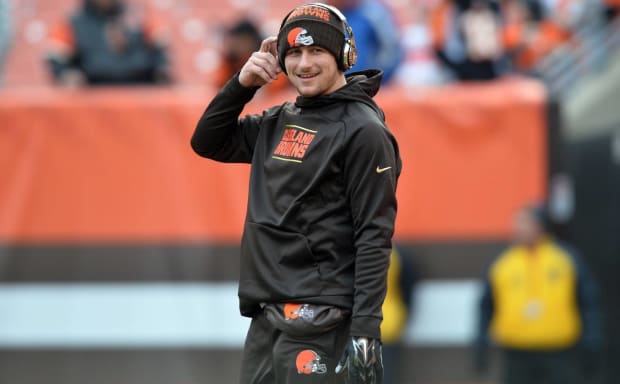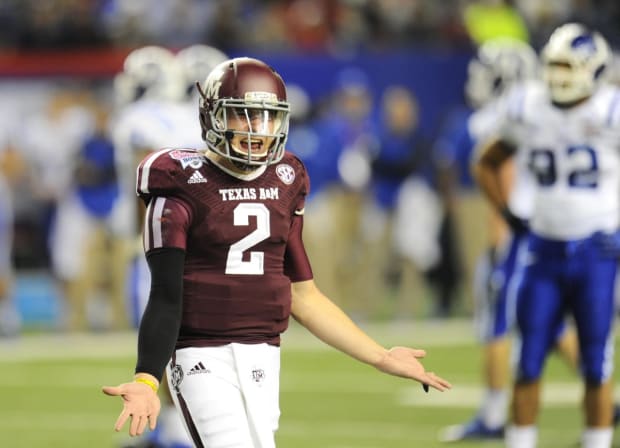The next documentary in Netflix’s sports series “Untold” debuts Aug. 8. Assuming you have yet to see it, you’re in good company. Neither has its subject.
Johnny Manziel, now 30, reckons he knows the story. He lived the story. He doesn’t need an advanced screener. When “Untold” drops, he’ll sit on a couch in his home outside Dallas and watch it like everyone else.
His story traces a familiar arc, the star athlete/entertainer who is unable/unwilling to resist the onslaught of fame and newfound wealth and all its trappings. But the same way Netflix now offers playback speeds of 1.25 and 1.5, the accelerated pace of Manziel’s rise and fall was extraordinary.
In 2012 he was the toast of college football, an undersized, swashbuckling quarterback whose feats included leading Texas A&M to a road win against Alabama, a game that still echoes more than a decade later. Conferred the perfect nickname—Johnny Football—he won the Heisman for the ’12 season. Though this was before name, image and likeness, and the era in which college athletes could be compensated without penalty, money found its way to him. As he puts it in the film, he was “a 19-year-old with a hundred grand stuffed under his bed.”
Manziel, of course, lived as he played: freewheeling, impetuous and without much use for convention. Playbooks were optional reading. Curfews were mere suggestions. Alcohol was there to be consumed. A first-round pick by the Browns in 2014, Manziel played 14 NFL games, his career undone mostly by self-sabotage and lousy decision-making. A series of comebacks failed to take hold. To its credit, the doc glosses over none of it.
In this installment of the series, “Untold” is something of a misnomer. The film, titled Johnny Football, provides few bombshells or bits of detail not already entered into the public record. Still, seeing the story strung together—and hearing Manziel narrate his recollections without guile or casting himself as victim—makes for a gripping watch, the precipitous slope of the decline, the sheer speed of the boom-and-bust rhythm, thrown into sharp relief.
In advance of the release, Sports Illustrated spoke with Manziel.
This interview has been lightly edited for clarity.

Ken Blaze/USA Today network
Sports Illustrated: You really haven’t seen the film?
Johnny Manziel: I’ll be watching Aug. 8. Kind of like everybody else.
SI: Really? Why?
JM: I just really haven’t reached out to Netflix or any of the producers and really asked. I was very involved with the process of getting people in to do their interviews and stuff.
SI: You could have said, Nah, I’m good. I don’t need to be [revisiting] all this. You didn’t. What was the motivation?
JM: I watched an episode of “Untold” on Mardy Fish and was enamored by it. I thought I really liked the way that they told his story. It intrigued me. From there, I felt like it was just time for me to kind of put a bow on the Johnny Football story and the Johnny Football saga of my life and be able to tell a story that I lived, that was very impactful in my life and my family’s life.
And also, you know, I think around the country, I’m kind of tired of the questions of walking down the street, being asked about it. Are you still playing football? Are you still doing this? Are you still doing that? I wanted to tell an amazing story about my time in college and the NFL and kind of what my life was. And just kind of put it behind me.
SI: So if someone stops you this afternoon on the street, you can say, Hey, listen. There’s a movie. It’ll answer all your questions.
JM: Pretty much.
SI: How long did you spend in the chair?
JM: Probably seven days or so.
SI: You know, it sounds like therapy. Did you make any breakthroughs?
JM: Yeah, I’ve analyzed this and overanalyzed this for a long, long time. You know, there has been a long period of time between the last time I’ve taken the snap of playing football and now. A lot has gone on in my personal life. A lot of things have changed. What it’ll be like hearing from different people’s perspective, maybe how my mom looked at it or my dad or, you know, Kliff Kingsbury, for example, or maybe my agent. There’s a lot of different ways to look at it rather than just my perspective. But, you know, for the most part, I felt [it was] easy to be able to go sit down and kind of walk somebody through this, for sure.
SI: It’s weird. Usually, it’s the other way around. I don’t want to give up any spoilers. But have you thought about how different this plays out in the era of NIL?
JM: No, I haven’t. I think the NIL and what’s going on in college sports right now is for the better. I think during my time in college it opened up the conversation a little bit. … I had a brand. I had a name. I had an image. I had a likeness that I could have capitalized on and made money. So, if anything, I think it helped open and spark the conversation.

Dale Zanine/USA TODAY Sports
SI: What do you want people to know about your life now?
JM: Compared to where I was in 2014, ’15 or ’16, you know, I’m in a great place. I’m in a place where I’m happy with my wife; happy with myself; the things that have happened in the past, you know, I don’t look back very much. I got to live a dream. That dream didn’t last as long as I would have liked it to and didn’t have as much success at the next level. You know, at the end of the day, if you would have told me as a 12-year-old kid, Hey, this is the way your life's going to go. And here's the script, I would have said, “This is everything I could have ever dreamed and everything I could have ever wanted.” I maybe just wish it would have lasted a little longer.
SI: Your happiness level now versus, say, 2014 …
JM: 2014 was probably a little bit of a high, but, you know, for me on a personal level and where I’m at with myself, it’s a 10 out of 10 compared to where it was then. It’s taken a lot of work to get here, and a lot has gone on. But, you know, at the end of the day, I feel better about it now.
SI: I can’t imagine going from the level of public eye you were in—which honestly is one of the themes of the film—to just being the dude that goes to Target like the rest of us.
JM: It’s nice. It’s really nice. You know when you’re a kid, in my memory, I wanted to be a good athlete, an athlete that was known. And when you get famous, it’s crazy how suffocating it can be at times. When you get famous, kind of all you want to do is go back to how it was before.
Now I’m a little bit more back into a place of how it was before. You know, I’m always going to have a person here or there who will come up to me and still have to deal with the fame in some way, shape or form. But it’s much more enjoyable now than it is the full-blown rock star level of fame.
SI: So Aug. 8, there’s going to be a rollout, and people are going to be [talking about it]; you’re sitting down to watch that. What’s that day [going to be like]?
Because at the end of the day, you know, it is my life, you know, it is my family. As far as watching it, I’ll definitely just kind of sit back and plop down and see if it’s as good as I expect it to be.







